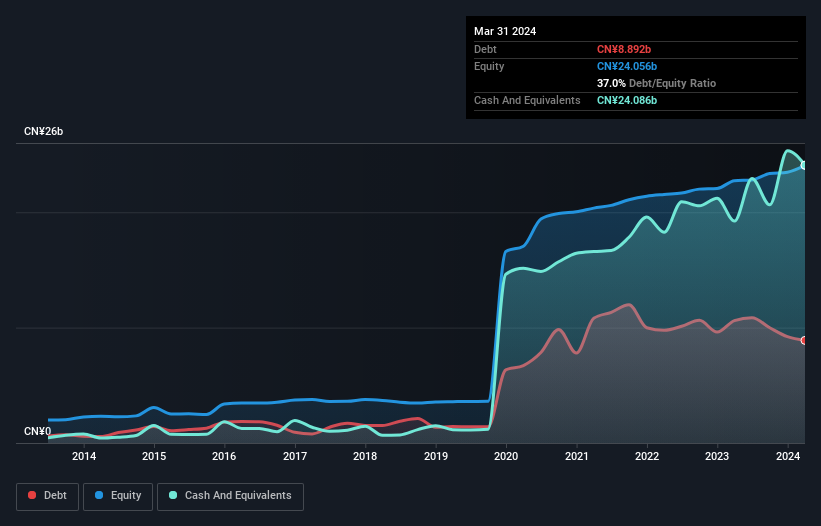
Legendary fund manager Li Lu (who Charlie Munger backed) once said, 'The biggest investment risk is not the volatility of prices, but whether you will suffer a permanent loss of capital.' So it seems the smart money knows that debt - which is usually involved in bankruptcies - is a very important factor, when you assess how risky a company is. Importantly, State Grid Yingda Co.,Ltd. (SHSE:600517) does carry debt. But should shareholders be worried about its use of debt?
Why Does Debt Bring Risk?
Debt and other liabilities become risky for a business when it cannot easily fulfill those obligations, either with free cash flow or by raising capital at an attractive price. If things get really bad, the lenders can take control of the business. However, a more usual (but still expensive) situation is where a company must dilute shareholders at a cheap share price simply to get debt under control. Of course, plenty of companies use debt to fund growth, without any negative consequences. The first step when considering a company's debt levels is to consider its cash and debt together.
Check out our latest analysis for State Grid YingdaLtd
What Is State Grid YingdaLtd's Debt?
The image below, which you can click on for greater detail, shows that State Grid YingdaLtd had debt of CN¥8.89b at the end of March 2024, a reduction from CN¥10.6b over a year. But it also has CN¥24.1b in cash to offset that, meaning it has CN¥15.2b net cash.

How Healthy Is State Grid YingdaLtd's Balance Sheet?
The latest balance sheet data shows that State Grid YingdaLtd had liabilities of CN¥19.8b due within a year, and liabilities of CN¥518.8m falling due after that. Offsetting these obligations, it had cash of CN¥24.1b as well as receivables valued at CN¥6.79b due within 12 months. So it actually has CN¥10.6b more liquid assets than total liabilities.
This surplus liquidity suggests that State Grid YingdaLtd's balance sheet could take a hit just as well as Homer Simpson's head can take a punch. On this view, lenders should feel as safe as the beloved of a black-belt karate master. Simply put, the fact that State Grid YingdaLtd has more cash than debt is arguably a good indication that it can manage its debt safely.
State Grid YingdaLtd's EBIT was pretty flat over the last year, but that shouldn't be an issue given the it doesn't have a lot of debt. The balance sheet is clearly the area to focus on when you are analysing debt. But it is State Grid YingdaLtd's earnings that will influence how the balance sheet holds up in the future. So when considering debt, it's definitely worth looking at the earnings trend. Click here for an interactive snapshot.
But our final consideration is also important, because a company cannot pay debt with paper profits; it needs cold hard cash. While State Grid YingdaLtd has net cash on its balance sheet, it's still worth taking a look at its ability to convert earnings before interest and tax (EBIT) to free cash flow, to help us understand how quickly it is building (or eroding) that cash balance. In the last three years, State Grid YingdaLtd created free cash flow amounting to 13% of its EBIT, an uninspiring performance. For us, cash conversion that low sparks a little paranoia about is ability to extinguish debt.
Summing Up
While we empathize with investors who find debt concerning, you should keep in mind that State Grid YingdaLtd has net cash of CN¥15.2b, as well as more liquid assets than liabilities. So we don't think State Grid YingdaLtd's use of debt is risky. There's no doubt that we learn most about debt from the balance sheet. But ultimately, every company can contain risks that exist outside of the balance sheet. These risks can be hard to spot. Every company has them, and we've spotted 1 warning sign for State Grid YingdaLtd you should know about.
If you're interested in investing in businesses that can grow profits without the burden of debt, then check out this free list of growing businesses that have net cash on the balance sheet.
New: Manage All Your Stock Portfolios in One Place
We've created the ultimate portfolio companion for stock investors, and it's free.
• Connect an unlimited number of Portfolios and see your total in one currency
• Be alerted to new Warning Signs or Risks via email or mobile
• Track the Fair Value of your stocks
Have feedback on this article? Concerned about the content? Get in touch with us directly. Alternatively, email editorial-team (at) simplywallst.com.
This article by Simply Wall St is general in nature. We provide commentary based on historical data and analyst forecasts only using an unbiased methodology and our articles are not intended to be financial advice. It does not constitute a recommendation to buy or sell any stock, and does not take account of your objectives, or your financial situation. We aim to bring you long-term focused analysis driven by fundamental data. Note that our analysis may not factor in the latest price-sensitive company announcements or qualitative material. Simply Wall St has no position in any stocks mentioned.
Have feedback on this article? Concerned about the content? Get in touch with us directly. Alternatively, email editorial-team@simplywallst.com
About SHSE:600517
State Grid YingdaLtd
Engages in the electrical, trust, securities, futures, and carbon asset businesses in China.
Flawless balance sheet with solid track record.
Similar Companies
Market Insights
Community Narratives




